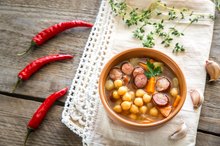Coumadin & Diabetes Diet
Diabetes is a condition that requires a careful balance between activity and diet. Although medications are often necessary to ensure that your blood sugar remains within a relatively narrow range to prevent complications, the diabetic diet is a critical component of a diabetic management plan. However, when a diabetic also needs to take the prescription medication Coumadin, there are some important considerations.
About Coumadin
Coumadin, or warfarin, is commonly called a blood thinner, although this does not accurately describe how the medication works. Coumadin is used to prevent blood clots; if you have had a stroke or heart attack, you may need to take this medication. Diabetes and Coumadin are similar in one way: With each, a component of the blood needs to stay within a certain range. For diabetes, this component is blood sugar; for Coumadin, it is the INR, a measure of how long it takes the blood to clot. This medication slows the clotting of the blood by blocking vitamin K, which is used in the clotting process. Because vitamin K is present in a number of foods, trying to manage diabetes and Coumadin together can present a problem.
- Coumadin, or warfarin, is commonly called a blood thinner, although this does not accurately describe how the medication works.
The Diabetic Diet
What Are the Side Effects of Cranberry Juice?
Learn More
A diabetic diet relies on a careful balance of proteins, fats and carbohydrates. The MayoClinic.com says a diabetic diet, also known as medical nutrition therapy, should emphasize fruits, vegetables and whole grains. The focus on vegetables and fruits can cause problems with Coumadin because some vegetables contain high amounts of vitamin K and some fruits contain substances that can interfere with the action of Coumadin.
Vegetables and Cranberries
Vitamin K is found in leafy green vegetables, an important part of a diabetic diet. Kale, chard, spinach and parsley contain high amounts of vitamin K and can decrease the effectiveness of Coumadin. Other sources of vitamin K include lettuce, broccoli and brussels sprouts. MayoClinic.com notes that although you should make sure you get enough vitamin K -- the daily recommended intake for adult women is 90 micrograms -- it's important to be consistent and avoid eating large amounts of these vitamin K-rich foods. Green tea also can interfere with Coumadin. Cranberry products are likely to increase the effect of Coumadin, leading to bleeding problems.
- Vitamin K is found in leafy green vegetables, an important part of a diabetic diet.
- Kale, chard, spinach and parsley contain high amounts of vitamin K and can decrease the effectiveness of Coumadin.
Considerations and Warnings
Drugs to Avoid When Taking Warfarin
Learn More
Diabetes is a complex medical condition, and Coumadin is a potentially dangerous medication. For your own safety, follow your diet plan carefully and take your medication as instructed. Talk to a health care professional if you have any questions or concerns.
Related Articles
References
Writer Bio
Beth Greenwood is an RN and has been a writer since 2010. She specializes in medical and health topics, as well as career articles about health care professions. Greenwood holds an Associate of Science in nursing from Shasta College.









